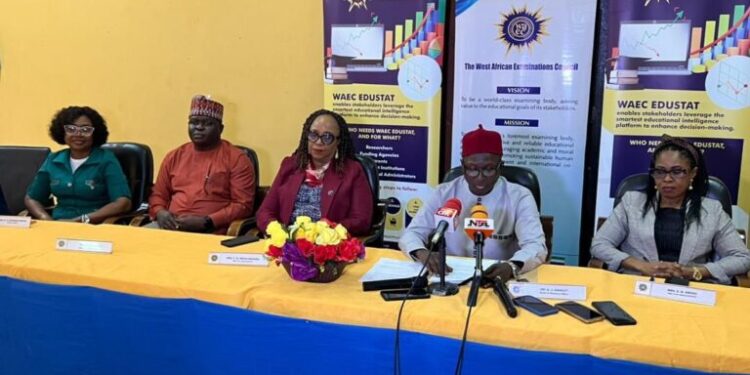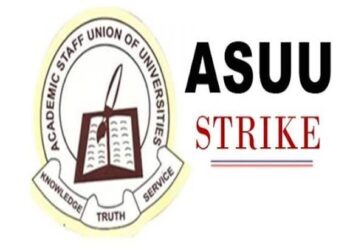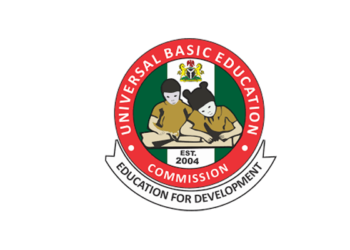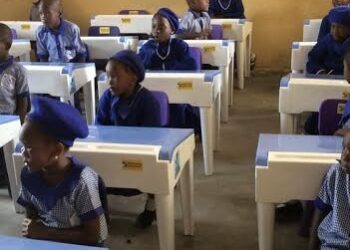The West African Examinations Council (WAEC) has withheld results of 215, 267 candidates, who sat for the 2024 West African Senior School Certificate Examination (WASSCE) (School Candidates) over alleged malpractice.
Dr Amos Dangut, Head, National Office (HNO) stated this while announcing the results on Monday, in Lagos.
According to Dangut, the number represents 11.92 per cent of candidates that sat for the examination.
He noted that the figure was 4.37 per cent lower than the 16.29 per cent recorded in the same diet, in 2023.
“The withheld results of these candidates that sat for the examination are in connection with various reported cases of examination malpractice.
“The increasing use of cell phones in the examination hall, in spite of the existing ban and organised cheating in some schools, are other nagging issues.
“All the cases are being investigated and reports of the investigations will be presented to the appropriate committee of the council, for consideration and final decisions,” he said.
The WAEC boss added that the committee’s decisions would be communicated to the affected candidates through their various schools, in due course.
He urged candidates affected by the decisions to call for redress of their cases, if they so wished, via https://waecinternational.org.
According to him, the council will continue to sanction all cases of examination malpractice.
He said that schools, supervisors, teachers and candidates perpetrating the evil were not helping the educational system.
“All hands must therefore be on deck to sanitise the system,” he said.
Giving a further breakdown of the results, Dangut said a total of 1,814,736 candidates registered for the examination from 25,126 recognised secondary schools in the country.
He said that of the total number of candidates that sat for the examination, 896,894 are male, while 908,322 others are female, representing 49.68 per cent and 50.32 per cent, respectively.
He added that of the 1,814,736 candidates that registered for the examination, only 1,805,216 sat the examination.
He noted that the examination was also administered to candidates from some schools in Benin Republic, Cote d’Ivoire and Equatorial Guinea, where the Nigerian curriculum for senior secondary schools was being used.
“Out of the total number of candidates that sat the examination in Nigeria, 1,685,889 candidates, representing 93.39 per cent have their results fully processed and released while 119,327 others, representing 6.61 per cent, have one or more of their subjects still being processed, due to some issues being resolved.
“Efforts are, however, speedily ongoing to complete the process and release the affected candidates’ results within a couple of days,” he said.
According to him, the analysis of statistics of candidates’ performance in the examination shows that out of the 1,805,216 candidates that sat for the examination, 1,332,089 representing 73.79 per cent obtained credit and above in a minimum of five subjects.
He explained that this was with or without English Language and or Mathematics.
Speaking further, he said a total of 1,301,941 candidates, representing 72.12 per cent obtained credits and above in a minimum of five subjects, including English Language and Mathematics.
“Of this number, 628,820, that is, 48.30 per cent are male candidates, while 673,121 representing 51.70 per cent are female candidates.
“A comparison of the percentage of candidates in this category in WASSCE for School, 2023 and 2024, reveals that in 2024 WASSCE, there is 7.69 per cent decrease in performance.
“That is when compared with those who obtained credit and above in a minimum of five subjects, including English Language and Mathematics, which was 79.81 per cent,” he said.
Dangut further said that a total of 109,115 candidates with varying degrees of Special Needs registered for the examination.
According to him, of the number, 145 are visually challenged, 473 have impaired hearing, 44 are spastic cum mentally challenged, while 38 are physically challenged.
“All these candidates were adequately provided for in the administration of the examination.
“The results of these candidates have been processed and are also now being released along with those of other candidates,” he said.
The WAEC boss cited security concerns as one of the challenges encountered by the council in conducting the examination nationwide.
“The ‘Sit-at-home’ order in the Southeast and the industrial action embarked upon by the Nigeria Labour Congress (NLC), coincided with the days major papers were to be written.
“These posed serious threat that could have deprived Nigerian candidates the privilege of sitting the papers with their counterparts in other member countries.
“I am exceedingly glad that the Nigerian populace saw reason to allow candidates sit all the papers.
“The non-adherence to registration deadline is perhaps the greatest headache the council encountered on the road to conduct this examination.
“This issue continued to linger as some schools failed to upload their students’ CASS at the stipulated time and many also failed to meet registration deadlines.
“It should be known to all and sundry that registration for WAEC examinations is not an open-ended thing.
“Pre-examination materials, examination materials and post-examination materials have to be produced, using data supplied by candidates in good time, before the conduct of any diet.”
He said that failure to meet the requirements would throw the entire process into jeopardy.
“We plead for co-operation and understanding in this respect, in order to make future exercises less stressful.
“We also faced financial issues and inflation.
“The rate of inflation in the country has affected the cost of everything and the council is not excluded.
“This has greatly added to the challenges we are facing in terms of the cost of conducting examinations,” he said.
He said that the constant hike in price and scarcity of petroleum products affected the seamless conduct of the examination.
This, according to him, was because the council had to move examination materials from one point to another.
The WAEC boss also decried the connivance of some supervisors with operators of rogue websites, to deceive and compromise the standard of the examination.
“During the course of inspection, activities of rogue website operators did not go unnoticed, as some of these miscreants are already having a taste of their pudding.
“A few supervisors and invigilators, who were caught aiding and abetting examination malpractice, were also brought to book.
“The council, on its part, through the Nigeria Examinations Committee (NEC), will mete out appropriate sanctions to affected supervisors, through the various State Ministries of Education,” he said.
Speaking further, he said as results of the 2024 WASSCE for School Candidates, were being uploaded on the website, candidates should, after checking, apply for their Digital certificate, which would be released 48 hours thereafter.
According to him, candidates who have fulfilled their financial obligations to the council can access their results on its results website:http://www.waecdirect.org,
within the next 12 hours.
“Copies of the result listing will be sent to schools shortly.
“I need not restate the fact that the results of candidates, who are sponsored by states indebted to the council, will not be released now, until payment is made.
“We appeal to the concerned to do so, to enable the affected schools/candidates access their results.
“The Result Checker PIN and Serial Number required by candidates to check their results online, are contained on the Candidate’s Smart Identity Card, issued and used during conduct of the examination.
“Hard copies of certificates of candidates whose results have been fully processed and released will be ready within the next 90 days, counting from today,” he stated. (NAN)











